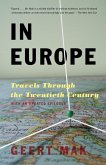The "civilization" of 20th-century Europe included many of the most revolutionary scientific advances in human history, some of the most original movements in art and music, and the creation of a "welfare state" offering greater and more varied opportunities to the ordinary citizen than any previous civilization. It democratized both traditional intellectual and artistic culture, and the popular culture of mass media entertainment, travel, and athletics. It witnessed the gradual extension of the concepts of human rights and religious and racial toleration. But the same century also included the two most destructive wars in human history; a large number of authoritarian, arbitrary, and incompetent dictatorships; and, in the forms of Nazism and Stalinism, the most vile and sadistic regimes of which we have any documented record. How can we understand the combination of such prodigious accomplishments and such devastating violence? And what can we learn from these contrasting events? Against this backdrop, eminent historian Gabriel Jackson deals with the political and cultural history of Europe in the 20th century. His book is not, however, a mere chronological survey concentrating on political and economic developments. Rather the major aspects of those developments, and of international relations-both peaceful and warlike-are seen as the necessary background for the consideration of European culture, values, practical expectations, and the lifestyles available to, or imposed upon, the population as a whole. In his discussion of its art, politics, and science, Jackson conveys the current significance, and the possible future, of a democratic and pluralistic Europe. Clarity of exposition makes the book ideal not only for scholars but for the lay reader as well.
Hinweis: Dieser Artikel kann nur an eine deutsche Lieferadresse ausgeliefert werden.
Hinweis: Dieser Artikel kann nur an eine deutsche Lieferadresse ausgeliefert werden.








